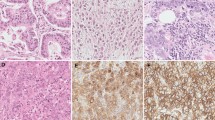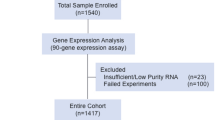Abstract
Purpose
Definition of the lineage of poorly differentiated neoplasms (PDNs) presenting as cancer of unknown primary site (CUP) is important since many of these tumors are treatment-sensitive. Gene expression profiling and a molecular cancer classifier assay (MCCA) may provide a new method of diagnosis when standard pathologic evaluation and immunohistochemical (IHC) staining is unsuccessful.
Patients and Methods
Thirty of 751 CUP patients (4 %) seen from 2000–2012 had PDNs without a definitive lineage diagnosed by histology or IHC (median 18 stains, range 9–46). Biopsies from these 30 patients had MCCA (92-gene reverse transcriptase-polymerase chain reaction mRNA) performed. Additional IHC, gene sequencing, fluorescent in situ hybridization for specific genetic alterations, and repeat biopsies were performed to support MCCA diagnoses, and clinical features correlated. Seven patients had MCCA performed initially and received site-specific therapy.
Results
Lineage diagnoses were made by MCCA in 25 of 30 (83 %) patients, including ten carcinomas (three germ cell, two neuroendocrine, five others), eight sarcomas [three peritoneal mesotheliomas, one primitive neuroectodermal tumor (PNET), four others], five melanomas, and two lymphomas. Additional IHC and genetic testing [BRAF, i(12)p] supported the MCCA diagnoses in 11 of 16 tumors. All seven patients (two germ cell, two neuroendocrine, two mesothelioma, one lymphoma) responded to site-specific therapy based on the MCCA diagnosis, and remain alive (five progression-free) from 25+ to 72+ months.
Conclusion
The MCCA provided a specific lineage diagnosis and tissue of origin in most patients with PDNs unclassifiable by standard pathologic evaluation. Earlier use of MCCA will expedite diagnosis and direct appropriate first-line therapy, which is potentially curative for several of these tumor types.
Similar content being viewed by others
References
Greco FA, Hainsworth JD. Cancer of unknown primary site. In: DeVita VT, Lawerence TS, Rosenberg SA, editors. Cancer: principles and practice of oncology. 9th ed. Philadelphia: Lippincott, Williams and Wilkins; 2011. p. 2033–2051.
Oien KA. Pathologic evaluation of unknown primary cancer. Semin Oncol. 2009;36:8–37.
Hainsworth JD, Greco FA. Gene expression profiling in patients with carcinoma of unknown primary site: from translational research to standard of care. Virchows Arch. 2014;464:393–402.
Hainsworth JD, Rubin MS, Spigel DR, et al. Molecular gene expression profiling to predict the tissue of origin and direct site-specific therapy in patients with carcinoma of unknown primary site: a prospective trial of the Sarah Cannon Research Institute. J Clin Oncol. 2012;31:217–23.
Ma XJ, Patel R, Wang X, et al. Molecular classification of human cancers using a 92-gene real-time quantitative polymerase chain reaction assay. Arch Pathol Lab Med. 2006;130:465–73.
Erlander MG, Ma XJ, Kesty NC, et al. Performance and clinical evaluation of the 92-gene real-time PCR assay for tumor classification. J Mol Diagn. 2011;13:493–503.
Kerr SE, Schnabel CA, Sullivan PS, et al. Multisite validation study to determine performance characteristics of a 92-gene molecular cancer classifier. Clin Cancer Res. 2012;18:3592–960.
Weiss LM, Chu PG, Schroeder BE, et al. Blinded comparator study of immunohistochemical analysis versus 92-gene cancer classifier in the diagnosis of the primary site in metastatic tumors. J Mol Diagn. 2013;15:263–9.
Kerr SE, Schnabel CA, Sullivan PS, et al. Use of a 92-gene cancer classifier predicts the site of origin for neuroendocrine tumors. Mod Pathol. 2014;27:44–54.
Greco FA, Lennington WJ, Spigel DR, et al. Molecular profiling diagnosis in unknown primary cancer: accuracy and ability to complement standard pathology. J Natl Cancer Inst. 2013;105:782–90.
Horning SJ, Carrier EK, Rouse RV, et al. Lymphomas presenting as histologically unclassified neoplasms; characteristics and response to treatment. J Clin Oncol. 1989;7:1281–7.
Motzer RJ, Rodriguez E, Reuter VE, et al. Molecular and cytogenic studies in the diagnosis of patients with midline carcinomas of unknown primary site. J Clin Oncol. 1995;13:274–82.
Hainsworth JD, Spigel DR, Litchy S, Greco FA. Phase II trial of paclitaxel, carboplatin, and etoposide in advanced poorly differentiated neuroendocrine carcinoma: a Minnie Pearl Cancer Research Network study. J Clin Oncol. 2006;24:3548–56.
Funding
This trial was supported by the Sarah Cannon Research Institute and through a grant from the Pearl Point Foundation.
Conflict of interest
None to declare.
Author contributions
The retrospective case review was designed and performed by F. Greco and J. Hainsworth. All authors contributed and reviewed the data. F. Greco had primary responsibility for writing the article, and all authors reviewed and approved the final content.
Author information
Authors and Affiliations
Corresponding author
Rights and permissions
About this article
Cite this article
Greco, F.A., Lennington, W.J., Spigel, D.R. et al. Poorly Differentiated Neoplasms of Unknown Primary Site: Diagnostic Usefulness of a Molecular Cancer Classifier Assay. Mol Diagn Ther 19, 91–97 (2015). https://doi.org/10.1007/s40291-015-0133-8
Published:
Issue Date:
DOI: https://doi.org/10.1007/s40291-015-0133-8




